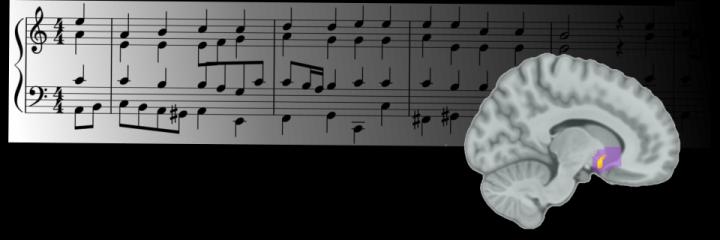Scientists prove difference between expected/actual outcomes cause reward response

Credit: Ben Gold
If you love it when a musician strikes that unexpected but perfect chord, you are not alone. New research shows the musically unexpected activates the reward centre of our brains, and makes us learn about the music as we listen.
Researchers led by Ben Gold, a PhD candidate in the lab of Robert Zatorre at The Neuro (Montreal Neurological Institute and Hospital), of McGill University, put 20 volunteers through a musical reward learning task. Each participant chose a colour, then a direction. Each choice came with a certain probability of leading to either a consonant, pleasurable, musical excerpt or a dissonant, unpleasurable one. Over time the subjects learned which choices were more likely to produce both consonant and dissonant music.
The test was designed to create an expectation of either musical enjoyment or dissatisfaction. Subjects performed this task while their brain activity was measured with functional magnetic resonance imaging (MRI).
Using an algorithm, the researchers then determined the reward prediction error for each choice–the difference between an expected reward and the actual reward received. They compared that data to the MRI data, and found that reward prediction errors correlated with activity in the nucleus accumbens, a brain region that in previous studies has been shown to activate when the subject is experiencing musical pleasure. This is the first evidence that musically elicited reward prediction errors cause musical pleasure. It is also the first time an aesthetic reward such as music has been shown to create such a response. Previous studies have focused on more tangible rewards such as food or money.
Subjects whose reward prediction errors most closely matched activity in the nucleus accumbens also showed the most progress in learning the choices that led to the consonant tones. This establishes music as a neurobiological reward capable of motivating learning, showing how an abstract stimulus can engage the brain’s reward system to potentially pleasurable effect and motivate us to listen again and again.
“This study adds to our understanding of how abstract stimuli like music activate the pleasure centres of our brains,” says Gold. “Our results demonstrate that musical events can elicit formally-modeled reward prediction errors like those observed for concrete rewards such as food or money, and that these signals support learning. This implies that predictive processing might play a much wider role in reward and pleasure than previously realized.”
###
The study was published in the journal Proceedings of the National Academy of Sciences on Feb. 6, 2019. It was funded with a Fulbright Canada STEM Graduate Award and a Natural Sciences and Engineering Research Council-CREATE fellowship to Gold, and by a Foundation Grant from the Canadian Institutes of Health Research and a Canadian Institute for Advanced Research Senior Fellowship to Zatorre.
The Neuro
The Neuro – The Montreal Neurological Institute and Hospital – is a world-leading destination for brain research and advanced patient care. Since its founding in 1934 by renowned neurosurgeon Dr. Wilder Penfield, The Neuro has grown to be the largest specialized neuroscience research and clinical center in Canada, and one of the largest in the world. The seamless integration of research, patient care, and training of the world’s top minds make The Neuro uniquely positioned to have a significant impact on the understanding and treatment of nervous system disorders. In 2016, The Neuro became the first institute in the world to fully embrace the Open Science philosophy, creating the Tanenbaum Open Science Institute. The Montreal Neurological Institute is a McGill University research and teaching institute. The Montreal Neurological Hospital is part of the Neuroscience Mission of the McGill University Health Centre. For more information, please visit http://www.
Media Contact
Shawn Hayward
@McGillU
514-389-3376
Original Source
https:/
Related Journal Article
http://dx.




